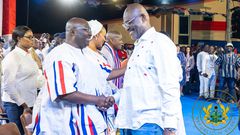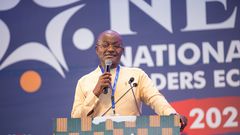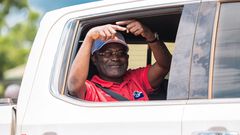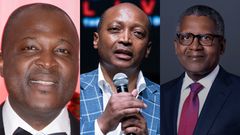In a landmark political event watched closely across West Africa, Ghana’s main opposition party, the New Patriotic Party (NPP), has concluded its official balloting process to determine the order of contenders in its upcoming presidential primary. Taking place at the party’s Asylum Down headquarters in Accra on the morning of October 10, 2025, the exercise set the stage for an election that will shape not just Ghana’s political landscape but also influence democratic trends across the region.
Kennedy Ohene Agyapong, former Member of Parliament for Assin Central and a figure recognized throughout West Africa for his outspokenness, claimed the coveted first spot on the ballot. Bruno Acheampong, a known reform advocate and serving government figure, secured the number two position. Dr. Mahamudu Bawumia, Ghana’s former Vice President and previous presidential flagbearer, drew the third position, while Dr. Yaw Osei Adutwum and Ing. Kwabena Agyei Agyepong rounded out the tightly contested list at numbers four and five respectively.

For keen observers in Nigeria and other West African countries, the order of candidates is of high interest as it often sets the tone for campaign narratives, internal alliances, and public excitement. The finalized ballot lineup is as follows:
-
Ken Ohene Agyapong
-
Dr Bryan Acheampong
-
Dr Mahamudu Bawumia
-
Dr Yaw Osei Adutwum
-
Ing. Kwabena Agyei Agyepong
Reaction from Team Agyapong
Shortly after the ballot, the atmosphere at the NPP headquarters shifted from tense anticipation to strategic optimism. Kwasi Kwarteng, spokesperson for Ken Agyapong’s campaign, addressed media representatives, praising the integrity of the process and the sense of fairness observed at the event. He emphasized that the favorable draw was not just a procedural win, but a morale boost for supporters nationwide, stating that it brings momentum as campaign activities intensify.
Mr Kwarteng said:
It was just five candidates. It was an open process, and the candidates had representatives who picked their own numbers. In terms of visibility and positioning, being number one gives us a lot of advantage.
He further highlighted that with the number one spot secured, the campaign would ramp up its engagement with delegates and voters across all regions. Their focus, he stated, would be on Mr Agyapong’s platform prioritizing job creation and empowering local economies—a message that resonates strongly with everyday Ghanaians and shares echoes with economic development concerns in neighboring Nigeria and other regional economies.
Latest Poll Prediction

Political observers across Ghana and neighboring countries are already abuzz with analysis following the release of a significant poll. The survey, conducted by the Pan-African civil society organisation Sanity Africa in October 2025, projects that Ken Agyapong is on course to win the NPP primaries, commanding an estimated 53.1% of the vote.
According to the survey’s findings, Mr Agyapong’s popularity and support have seen noteworthy growth, especially among grassroots delegates. This surge reportedly reflects widespread endorsement of his focus on economic revitalization and employment opportunities—a topic with striking parallels in Nigeria, where youth unemployment and sustainable economic development remain central issues in national debates.
The Wider Impact: Ghana’s Primaries in West African Perspective
Elections within major political parties in Ghana are never just local affairs. Their outcomes often send ripples across regional democracies, particularly as both Ghana and Nigeria routinely serve as bellwethers for political and economic trends in Anglophone West Africa.
Analysts, such as Abuja-based political commentator Aderemi Akintoye, note that the NPP’s transparent balloting process stands out as a model of internal party democracy amid challenges elsewhere. “The smooth and open way the NPP conducted their ballot is the sort of standard we wish to see more often in the region,” Akintoye said. “It boosts confidence that credible, competitive primaries are possible, not just in Ghana but across West Africa.”
Voters and delegates in Nigeria are paying close attention, with many drawing comparisons to recent primaries within major Nigerian parties. According to regional analysts, the ability of Ghanaian parties to conduct peaceful internal contests often strengthens local democratic credentials and fuels broader civic engagement.
What Sets the 2026 NPP Primaries Apart?
The upcoming NPP contest is notable for several reasons. For the first time, a former Vice President is vying for the party’s ticket amid a field of seasoned politicians and technocrats. The mix of veteran lawmakers, reformers, and development-driven candidates reflects the increasingly diverse expectations of voters—not only in Ghana but throughout West Africa’s emerging democracies.
Moreover, the primaries have attracted attention for their focus on economic policy, youth development, and anti-corruption—issues that are top priorities for millions of Nigerians and West Africans wrestling with economic shocks, inflation, and changing employment prospects.
Chinonso Ezeanochie, a Lagos-based business journalist, points out that, “Nigerian political parties and reformers often look to Ghana as an example, especially in areas of intra-party competition and transparent political financing. The NPP’s ability to organize such a high-profile primary without major disputes or violence is something Nigeria and other countries in the region can emulate.”
Challenges, Counterpoints, and Expectations
Even as polls predict a strong showing for Ken Agyapong, political analysts caution against assuming the outcome is set in stone. The NPP, like most African parties, has experienced last-minute swings, coalition shifts, and the influence of external events. Detractors have raised concerns about whether all candidates can campaign on truly equal footing, especially with incumbency advantages or political alliances at play.
Comparative polls in Nigeria and Ghana have at times failed to predict the final outcome, with ground mobilization, debate performance, and late endorsements frequently tipping the balance. As such, experts recommend watching not just opinion polls but also underlying delegate sentiments and ongoing coalition negotiations.
Lessons for Nigeria and the Continent
As Ghana prepares to move into the heart of its presidential selection season, the lessons for Nigeria and the continent are clear: robust internal democracy, fair procedures, and a focus on economic progress remain central to winning public trust. Civil society organizations, the media, and grassroots political actors across West Africa will be watching the NPP process closely for signals on best practices and emerging trends.
Your Thoughts?
The next phase of Ghana’s NPP primary race promises unprecedented competition and the possibility of transformative leadership—echoing challenges and aspirations seen throughout the region. For Africans invested in democracy, youth empowerment, and economic resilience, the significance of these primaries transcends borders.
How do you see the Ghanaian party primaries shaping political culture in West Africa? Can lessons from the NPP’s transparent process strengthen democracy and party politics in Nigeria or elsewhere? What challenges still need to be addressed? Share your insight below and stay tuned for ongoing coverage!
Join the Conversation!
Have a story, political tip, or election insight to share? We want to hear from you! Email us directly at story@nowahalazone.com—you could see your story featured or discuss story sales and submissions.
For general questions or support, reach us at support@nowahalazone.com. Want even more updates and expert takes on West African politics? Connect with us on social media:
Facebook,
X (Twitter), and
Instagram.
Let your voice be heard and stay informed as West Africa’s biggest political stories unfold!










